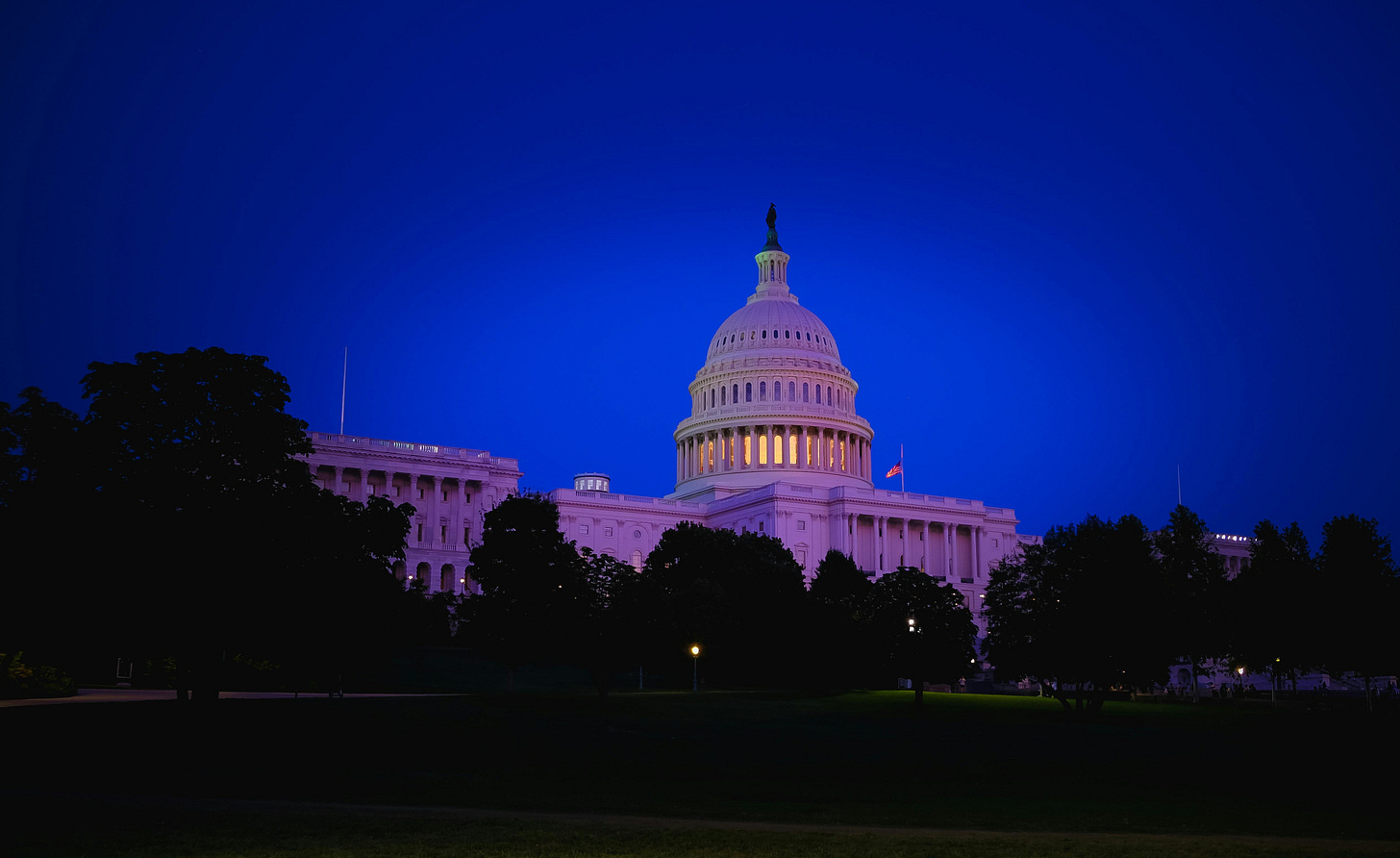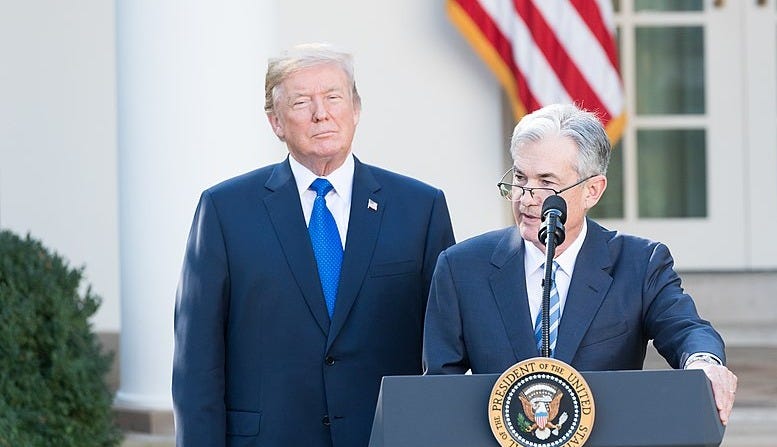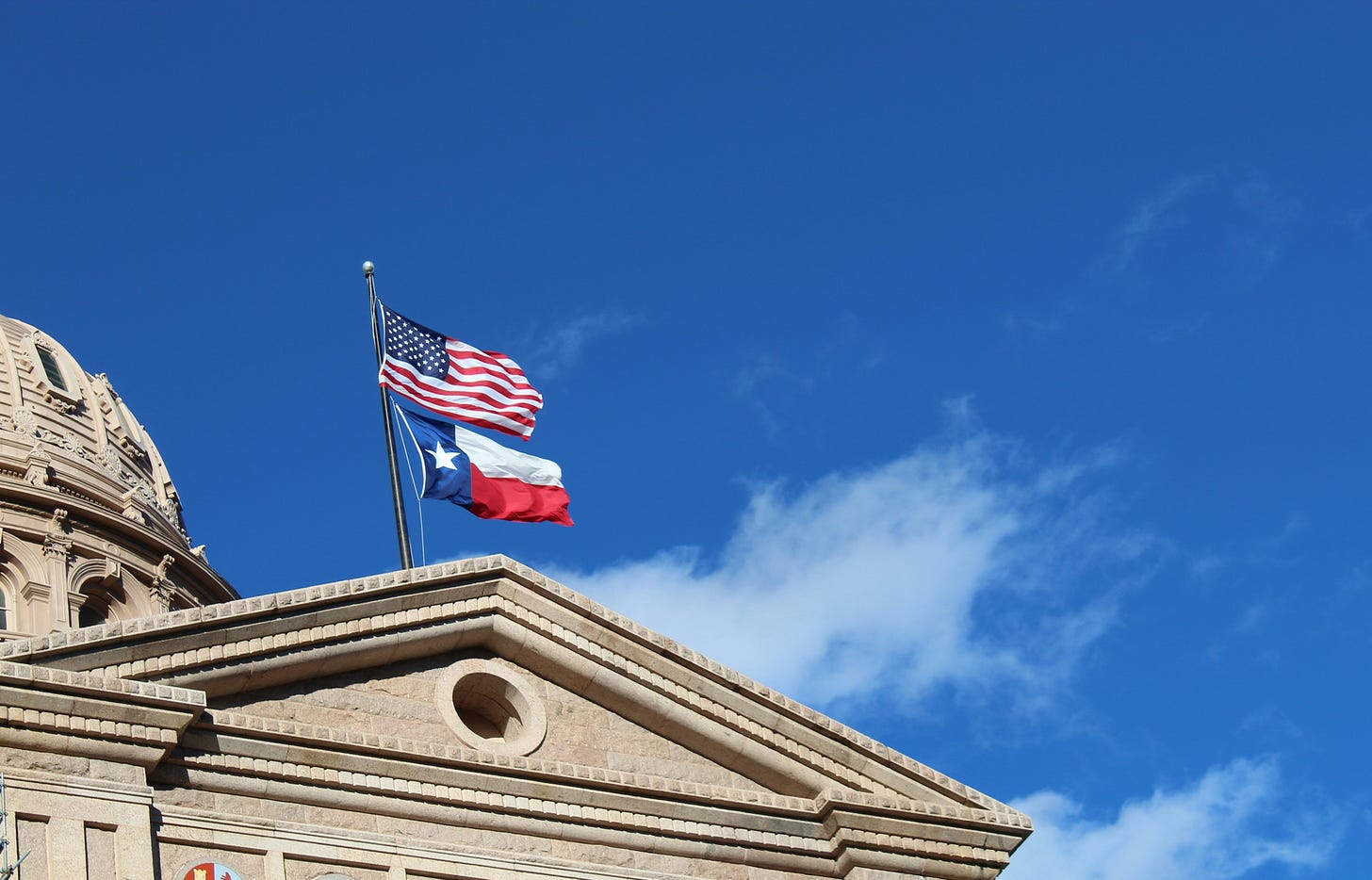Texas Spending Spree, School Choice Gaps & Federal Fiscal Failures | This Week's Economy Ep. 109
Newly passed Texas budget and school choice legislation—plus a look at federal spending, tariffs, and the CFPB's data grab.
Hello Friends!
Three headline-grabbing bills just passed in Texas: 1) SB 1 is the record-high $337 billion state biennial budget, 2) HB 2 is a significant expansion of government school funding by $8 billion, and 3) SB 2 is the state’s first-ever school choice program of ESAs of $1 billion for at most 100,000 students or just 1.5% of the 6.3 million school-age kids.
These fail to deliver the results Texans expected. Despite claims of $51 billion in property tax relief over time, Texans continue to see higher property tax bills. And while the school choice bill is a milestone, it’s far from universal and may backfire without serious reform. If this is what passes for bold conservative leadership in Texas, taxpayers have every right to ask:
Will the real conservatives please stand up?
There is still plenty of work to be done on these issues and others in Texas and beyond. I dive into it all on this week’s episode of This Week’s Economy. Get the full episode on YouTube, Apple Podcast, or Spotify, and visit my website for more information.
1. TEXAS SPENDING & SCHOOLING
In the News:
Three major bills recently passed in Texas: the state’s largest two-year budget of $337 billion, largest government school funding expansion of at least $8 billion, and the first school choice bill of $1 billion. Sources: The Texas Tribune, FOX 4
My Take:
Results are Not as Promised: Texans have a right to feel cheated as policymakers fail to deliver true tax relief and universal school choice. Republican lawmakers are claiming they provided $51 billion in property tax relief with the 2026–27 budget version CSSB 1, but if this is what passes for fiscal conservatism in Texas, then California-style budgeting has officially arrived in the Lone Star State. The true number is closer to $6 billion.
Tricking Texan Taxpayers: Despite claims of $51 billion in tax relief, Texans continue to face rising property tax bills. Preliminary 2024 data shows increases again—part of a long trend, with property taxes falling only once since 1998. Most have outpaced population growth plus inflation. This budget missed the opportunity to phase out further school district M&O property taxes—the largest component of most people’s tax bill. Instead, lawmakers protected the status quo, increased spending, and expanded government.
School Choice Partial Victory: The passage of CSSB 2 marks a historic win for Texas families, granting parents the authority to direct public education funds to private schools, tutors, homeschooling, and other educational options. But the bill has serious flaws. Without key reforms, this Education Savings Account program risks falling short—or sparking backlash that could set school choice back for years.
Related: Read my debriefs on the passage of this record-breaking budget and historic school choice bill on Substack.
2. NATIONAL SPENDING & TAXES

In the News:
Despite the Department of Government Efficiency’s (DOGE) efforts, federal spending remains elevated since President Trump took office. While Musk has identified around $150 billion in potential savings, this is a modest reduction compared to the $6.8 trillion in federal spending that operates largely on autopilot. Additionally, the administration has yet to extend the Tax Cuts and Jobs Act (TCJA), set to expire at the end of this year. Recently, small business owners in Dallas advocated for the permanence of these tax cuts during a roundtable hosted by U.S. Senator John Cornyn. Sources: The Wall Street Journal, Inc., and CBS News
My Take:
Rein in Federal Spending: President Trump must urge Congress to implement spending limits that cap expenditures at a rate not exceeding the maximum of population growth plus inflation. This approach ensures fiscal sustainability while leaving private productivity untaxed, fostering innovation and economic expansion. It also connects directly with taxpayers, reflecting real-world constraints and helping address our country’s economic situation.
Return Surplus to Taxpayers: Spending limits generate surpluses during periods of economic growth, which can be used to reduce tax rates. For example, President Trump’s last federal budget included a spending cap, recognizing its potential to align government incentives with taxpayers’ interests.
Make Tax Cuts Permanent: If Congress doesn’t make the Tax Cuts and Jobs Act (TCJA) permanent, families will pay more at tax time, even as they struggle to keep up with everyday expenses. The child tax credit will shrink, the standard deduction will be cut in half, and married couples could face the marriage penalty again. These aren’t line items on a spreadsheet—they’re costs that hit families at the kitchen table. Businesses also benefit from cuts as they can invest more in innovation and job creation. To truly put America first, we must lower spending, make the Trump tax cuts permanent, reduce regulations, and engage our allies in free trade that benefits everyone.
Related: I recently wrote about how extending the Tax Cuts and Jobs Act will benefit Americans at the Pelican Institute.
3. CFPB’S DATA GRAB IS THEFT

In the News:
The Consumer Financial Protection Bureau (CFPB) recently released a legal memo outlining its operational stance, stating, “The Bureau shall not engage in attempts to create price controls.” Yet with its new Section 1033 rule, that’s exactly what it’s doing—setting the price of private financial data at $0. Source: The Wall Street Journal’s Brian Schwartz shares the CFPB’s memo
My Take:
Protecting Consumers or Controlling Markets? When the government shifts from protecting consumers to controlling markets, the results are harmful. The CFPB—an agency that never should’ve existed—is doing just that with its new Section 1033 data-sharing rule.
The Issue: The CFPB wants to force banks and credit unions to hand over your private financial data to third-party tech firms—mostly Fintech startups—without compensation. In other words, the government is demanding that private institutions provide “free” access to their infrastructure, systems, and customer data. Bureaucrats call it “consumer empowerment,” but in reality, it’s regulation-driven theft—paid for by everyday Americans.
The Right Approach: If consumers want to share their data, they should be free to do so. However, access to bank infrastructure should be granted through voluntary agreements. Fintech firms should negotiate and pay for it like any other business in a free market. That’s how innovation thrives, investment is rewarded, and consumers are truly protected.
Related: I expose what this rogue agency is up to—and why the next administration must act—on Substack.
4. TENSIONS BETWEEN TRUMP & POWELL

In the News:
Last week, President Trump ramped up pressure on Federal Reserve Chairman Jerome Powell, calling him a “major loser” and warning that the U.S. economy could stall without lower interest rates. Sources: CNN and CNBC
My Take:
The President’s Role in Monetary Policy: While presidents often comment on Fed decisions, they shouldn’t attempt to direct monetary policy. That kind of interference risks worsening outcomes—even more than the Fed’s missteps.
A Needed Reminder of the Fed’s Mandate: The Fed’s job is to maintain price stability and maximize employment. With a bloated $6.7 trillion balance sheet, inflation pressures remain high—and they're being made worse by tariffs and unchecked federal spending.
What Should Happen: Instead of pushing for rate cuts, the Fed should focus on reducing its balance sheet. The President, meanwhile, should stick to what he can control: trade and fiscal policy. That means dialing back tariffs and urging Congress to rein in federal spending. A smart fiscal rule—tying spending growth to population growth plus inflation—would stabilize the budget and help tame inflation.
Related: Before Trump even took office, I discussed some of these dynamic on an episode of This Week’s Economy.
5. TARIFFS CAUSE LAYOFFS

In the News:
Market uncertainty driven by tariffs is already leading to layoffs in American manufacturing. Volvo Group has announced plans to cut 800 jobs, while Mack Trucks expects to lay off 250 to 300 workers. Meanwhile, a Goldman Sachs report projects that President Trump's tariffs may create 100,000 new manufacturing jobs—but at the cost of 500,000 other jobs. Sources: Reason Magazine and CBT News
My Take:
Is This Winning? We’re already feeling the consequences of protectionist policies—and it’s only getting worse. Instead of correcting course with stable, pro-growth reforms, President Trump’s sweeping new tariffs attempt to reshape trade by brute force. But rather than strengthening the economy, they inject uncertainty, fuel inflation, and raise prices on everyday goods.
What Winning Really Looks Like: Putting America first means reducing government spending, making the Trump tax cuts permanent, streamlining regulations, and pursuing free trade with our allies. That’s how we boost growth, not with tariff wars.
Trade Offers Prosperity: Trade isn’t a weapon—it’s a bridge to opportunity, innovation, and peace. Free trade lowers costs, expands choices, and fosters economic growth. Historical evidence suggests that trading nations are less likely to engage in war. Tariffs, on the other hand, make us poorer and more isolated. They reflect fear—not strength—fear that American businesses can’t compete unless Washington rigs the rules. That fear invites retaliation, not respect. And ultimately, Americans will pay the price.
Related: Have you wondered about tariffs, protectionism, and trade wars and why they influence your stocks and livelihood? I recently wrote on the impacts on Substack.
6. POLITICIANS PLAY DIGITAL PARENT

In the News:
Two proposed bills in Texas, Senate Bill 2420 and its companion House Bill 4901, would require app stores to verify users’ ages, assign minors to their parents’ accounts, and block access to apps unless parental consent is obtained. The bills also mandate sharing sensitive information across platforms to enforce these requirements. Sources: SB 2420 and the App Store Accountability Act (HB 4901)
My Take:
Parents Need Freedom, Not More Government: Texas families don’t need more government telling them how to parent—they need more freedom, tools, and trust. However, SB 2420 and HB 4901 go in the wrong direction. Although aimed at protecting kids online through age verification, this approach shifts parenting responsibilities from families to politicians and bureaucrats.
Protecting Kids Doesn’t Mean Sidelining Parents: As a father of three, I get the importance of shielding kids from harmful content. But that doesn’t mean we hand over parenting to the government or turn tech companies into digital babysitters. SB 2420 assumes politicians know better than parents. That’s not just wrong—it’s dangerous. The bill would require app stores to determine who qualifies as a parent, assign app age ratings, and share user data across platforms—all without obtaining consent. It’s a privacy disaster and a massive government overreach.
Real Solutions Empower Families: We’ve seen what happens when states overregulate tech. California’s rules stifled innovation, limited choice, and increased compliance costs, ultimately harming startups and benefiting Big Tech. Texas shouldn’t repeat those mistakes. Instead of centralizing control, lawmakers should focus on promoting transparency, digital literacy, and empowering parents with more effective tools. Let families make the decisions, not government agencies pretending to know best.
Related: Check out my full piece on this real well-intentioned policy that is terrible for privacy and bad for innovation on Substack.
Thanks for joining me in this episode of "This Week's Economy." For more insights, visit vanceginn.com and get even greater value with a paid subscription to my Substack newsletter at vanceginn.substack.com.
God bless you, and let people prosper!
Keep reading with a 7-day free trial
Subscribe to Let People Prosper to keep reading this post and get 7 days of free access to the full post archives.









